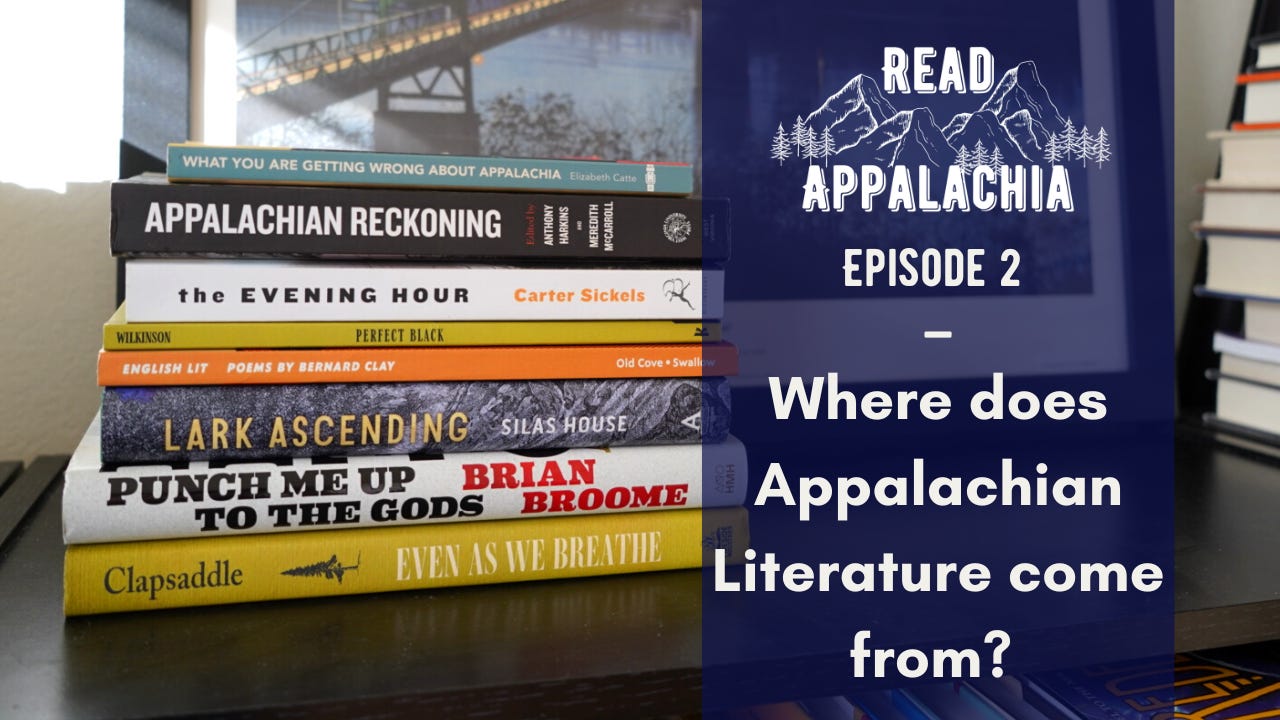
One of the biggest solo projects I’ve ever had, Read Appalachia holds a special place in my heart. I love the people from my region and our literature. For each episode of Read Appalachia, I sketch out my ideas for the introduction for each episode. I’ll be including these snippets here for folks to enjoy. These posts will be bonus posts in addition to Winchester Ave’s regular content.
Episode 2 - Introduction
(Originally Published on February 8th, 2023)
Welcome back to my library, one of the only libraries in the world run by Corgis. Laughs ah but it is delightful to come in here for some peace and quiet. At this time in the afternoon the light shines across the room, and as I sit working in here for a few hours, I can see the light move across the spines of my nonfiction section. Fun fact about my library: I organize my books by publishing imprint. I love seeing the different kinds of books any given imprint puts out just by looking at what’s on my shelf.
I don’t remember when I fell in love with books. No, not reading. Books, the physical objects that contain the world so many of us dive into to travel to far away places in our minds and escape the drudgery of our own lives.
I’m disabled, and part of that for me is being unable to read text for any significant length of time. It’s been like this as long as I can remember. Thankfully, at this point, I can adapt with audiobooks and other accessibility aids. But physical books became the object of my affections long before I could find a way into their stories. Their smooth covers and textured paper. That sweet and musty new book smell. The sound of their turning pages. And my favorite: a book with vibrant end papers, as stylish as a colorful lining in a suit jacket. My mom would take me to the library to check out more audiobooks, but I’d always find myself wandering the library stacks and running my fingertips along the spines of all of the books I wished I could read.
Fast forward to my senior year of my undergrad Creative Writing major, and I found myself in an Intro to Publishing course. I learned about the major publishing houses, now known as the Big Five: Penguin Random House, Simon & Schuster, Hachette, Harper Collins, and Macmillan. I learned about frontlist books—the new books coming out in a given season—and backlist books—the older books that came out awhile ago. I even learned about printing and binding. I distinctly remember gleefully writing an entire paper on different kinds of book binding. I was absolutely ridiculous. But after a semester of an intense amount of information, I fell in love with publishing. I even ended up moving on to get my M.A. in English, working as a graduate assistant at the university’s publishing division. And the rest is history. Well, almost most.
But I will say, working in publishing and in bookish media has really made me ask myself, who is publishing the books I read? What kinds of people are choosing the stories that get told? And if I want Appalachian people to be able to tell our own stories, do Appalachian people need to also be the ones behind the scenes working as editors, publicists, etc? For Appalachia, what does book publishing look like?
This question could mean a lot of things, but for today’s purposes, we are taking a look at publishing, the makers of the books we hold dear . . . and the books we wish hadn’t been published *cough* the book that shall not be named *cough* Great books—great Appalachian books—come from so many different kinds of publishers. Some authors publish with the Big 5, like David Joy, Dorothy Allison, or Ron Rash. Others come from University Presses, like Crystal Wilkinson, Annette Saunooke Clapsaddle, or Robert Gipe. And some come from indie presses, like Carter Sickels, Scott McClanahan, and Elizabeth Catte. But today, we’re going to focus on presses IN Appalachia and the unique—very important perspective—they bring to the table when they publish their books.
Now starting your journey into better understanding where our books come from can be overwhelming, but no worries. I’m here for you. So thinking this over, I thought I’d start with two publishers from Appalachia who have really illustrated that they are invested in our region’s literature. Later in the show, I’ll be talking to Meg Reid, the Director of Hub City Press. Full disclosure, Hub City Press is my local indie publisher, so I may be a little biased, but I think they are doing such great work over there.
But first, I’m talking to Derek Krissoff, the director of West Virginia University Press, which is West Virginia’s largest book publisher. Now I could sit here and tell you about Derek’s different work experiences, but how about we start with Derek introducing himself.



